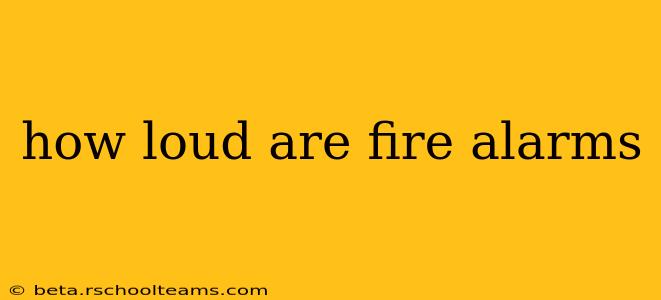How Loud Are Fire Alarms? A Deep Dive into Decibel Levels and Safety
Fire alarms are designed to be loud enough to wake you from a deep sleep and alert you to a potential fire hazard, even if you're in another room. But just how loud are they? The answer isn't a simple number, as it varies depending on several factors. Let's explore the decibel levels, regulations, and potential implications for hearing safety.
What is the decibel level of a typical fire alarm?
A standard fire alarm typically registers between 85 and 110 decibels (dB) at a distance of 10 feet. To put this into perspective, normal conversation is around 60 dB, while a lawnmower can reach 90 dB. This loudness is intentional – it needs to be easily audible over other household noises and even the sound of a fire itself.
Why are fire alarms so loud?
The high decibel level is critical for several reasons:
- Emergency Alert: The primary purpose is to immediately alert occupants to a potential fire, giving them crucial time to evacuate safely. A quieter alarm might not be heard, especially in sleep or amidst other distractions.
- Penetration of Noise: The loudness ensures the alarm can penetrate common household noises like televisions, music, or running appliances.
- Distance Considerations: The sound needs to travel through walls and across distances to reach all parts of the building effectively.
Are all fire alarms equally loud?
No, the loudness can vary based on several factors:
- Type of Alarm: Different types of fire alarms, such as smoke alarms, heat alarms, and carbon monoxide detectors, may have slightly different decibel levels. However, most are designed to meet minimum sound requirements.
- Age of the Alarm: Older alarms may have degraded components, leading to a reduction in sound output. Regular testing and replacement are crucial.
- Battery Condition: Low batteries can significantly affect the volume of the alarm. Regular battery checks are essential.
- Location: The placement of the alarm within a room can also affect the perceived loudness.
Can fire alarms damage hearing?
While the loudness is essential for safety, prolonged exposure to such high decibels can potentially damage hearing. However, the short bursts of sound during a fire alarm are unlikely to cause permanent hearing damage. Nevertheless, it's advisable to move away from the alarm quickly once it's been heard to reduce exposure.
How often should I test my fire alarms?
Testing your fire alarms is critical for ensuring they are functioning correctly and are loud enough to alert you in case of an emergency. Most experts recommend testing your alarms monthly and replacing them according to manufacturer recommendations, typically every 10 years for smoke alarms.
What are the legal requirements for fire alarm loudness?
Regulations regarding fire alarm loudness vary by location, but most jurisdictions have minimum decibel requirements. These are typically enforced through building codes and fire safety standards. Consult your local fire department or building codes for specific regulations in your area. Compliance is vital to ensure building safety and protect occupants.
This information should not be considered a replacement for professional advice. Always consult with local fire safety officials for specific regulations and recommendations in your area. Regular testing and maintenance of your fire alarms are crucial for the safety and well-being of you and your family.
